Oregon Becomes Hub of Lama’s Virus Adaptations
Written by: AlejAndro Anastasio
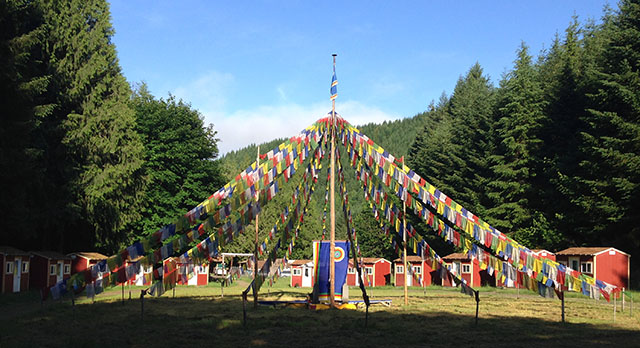
Retreatants practice in huts around the Mandala Garden, at the Dzogchen Retreat Center in Oregon.
Photos by: AlejAndro Anastasio, Bodhi Lama Padma Wongmo
Responding to the pandemic, Dzogchen Khenpo Choga Rinpoche and students during 2020 moved a vast array of complex Tibetan Buddhist practices and trainings to the internet, including five Northwest centers and a global retreat center in Oregon.
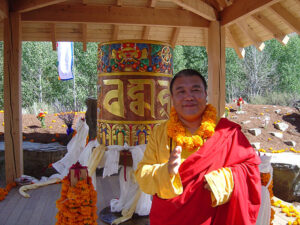
Dzogchen Khenpo Choga Rinpoche with the prayer wheel in the Sawtooth Botanical Gardens in Sun Valley, Idaho.
Rinpoche’s U.S. organization, called Dzogchen Shri Shinga Foundation, is headquartered in Oregon and also operates and is developing the Dzogchen Retreat Center on 160 acres. Our five Northwest centers support Sangha in Eugene and Portland, Oregon; Seattle and Port Townsend, Washington; and Boise, Idaho. Sangha members also operate a center in Vancouver, British Columbia.
Adapting the activities of the Oregon Dzogchen Retreat Center to the pandemic, and doing so through the internet, was of primary importance during 2020.
The Dzogchen Retreat Center is essential to students of Dzogchen Khenpo Choga Rinpoche, and to his Dzogchen lineage of Vajrayana Buddhism. The retreat center has brought stability to our national organization, and is the base of support for our Sangha in the United States and around the world.
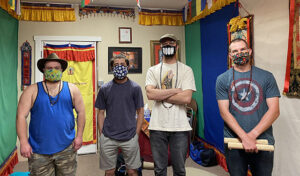
A few volunteers cleaning the Boise Dharma Center, after a last in-person practice before the pandemic surged in March.
Since we purchased the land in 2007, the retreat center has allowed us to gather and practice at much-deeper levels. We have been able to engage more sincerely in ceremonies, and to take time to more profoundly contemplate and practice what it means to be free from suffering and the causes of suffering.
Adapting the retreat center’s activities to the pandemic required significant innovation and risk-taking. For instance rather than flying in students from around the world for the annual Dzogchen summer internships, we moved these internships online. We also created our first Internet Teacher Training Program.
The Dzogchen Retreat Center, USA, nationally affiliated sanghas, and the Dzogchen Shri Singha Foundation, USA, are all part of a larger parent group, Dzogchen Shri Shinga Foundation International. The latter operates centers around the world.
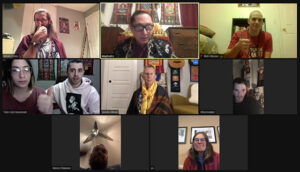
After we closed the Boise Dharma Center to in-person practice, we adapted and took our trainings online.
Dzogchen Khenpo Choga Rinpoche is a traditional Tibetan lama and Dzogchen master who was born in Tibet. As a lineage holder he trained and practiced extensively in Tibet, before establishing the foundation.
From the very beginning of the pandemic Rinpoche has offered daily online teachings to members of the global Sangha. He has supported leaders in all his global centers to also teach weekly online, as support to local members. This has given us the opportunity to meet daily and weekly with our local Sanghas, and to train with our teacher and other lamas and monks within our lineage.
As examples of our adaptations, in the last months of 2020 we offered a series of innovative online programs. Most recently, on Dec. 4 through 6 we offered the online 2nd Annual 2020 International Dzogchen Buddha Path Buddhism and Science Conference. This virtual three-day Zoom conference was hosted by Dzogchen Shri Singha Foundation, USA, and featured international researchers, scientists and practitioners in the fields of medicine, pharmacology, physics, mathematics, and computer science.
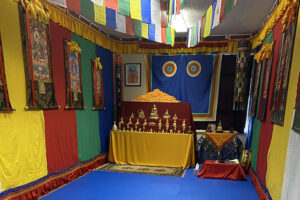
The Boise Dharma Center before practice begins.
The format consisted of speakers, presentations, discussions, audience Q&A, and commentary by Rinpoche. The mission and goal of this unique conference was to liberate all beings from suffering and establish them in true happiness. Another goal was to integrate the profound wisdom of ancient Buddhism and the vast knowledge of modern science, to improve the lives of this and future generations and to swiftly transform the world into enlightened peace and happiness.
Nov. 7 and 8 we offered another global digital event for the citizens of the world, our first Annual Sacred Arts Competition. The event also attracted Sangha members from around the world, who offered paintings, music, poetry and fine art.

The second annual 2020 International Dzogchen Buddha Path Buddhism and Science Conference went online.
A semi-final round of artists from North America, Europe, Russia and Asia was judged by a panel of creative members within our lineage. Then all the semi-final winners moved on to the international final round, where we put our best work forward in the spirit of healthy competition. All submissions had to reflect valid and clear teachings of the Buddha. Viewing, judging, and the award ceremony were all done online.
Also in 2020 we hosted two global Buddhist ceremonies for world peace. The Padmasambhava Drupchen was broadcast without a break October 17 through 19 via the internet, while the Green Tara Drupchen was broadcast similarly June 5 through June 7.
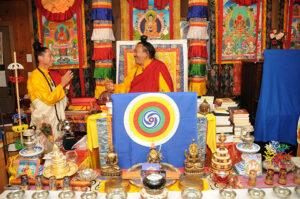
AlejAndro Anastasio greeting his teacher, Dzogchen Khenpo Choga Rinpoche, after the 2012 Dzogchen summer internship.
Drupchen translates to “vast accomplishment,” and is a form of intensive group practice that epitomizes the depth, power and precision of Tibetan Vajrayana Buddhism. These three-day online Drupchen ceremonies were open to anyone of any faith from around the world. Both were 72-hour non-stop global practices. Different Sanghas in our lineage from around the globe hosted two-hour blocks, illustrating how each culture engages in this beautiful and powerful ceremony.
But the most complex adaptation we faced, as mentioned, was moving the Oregon Dzogchen Retreat Center’s activities online. It took a lot of reorganization, some diligent study of how Zoom meetings work, and the support of our entire global Sangha to ensure our ability to continuously practice Dharma with our teacher.
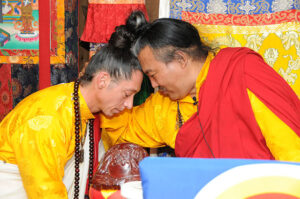
Anastasio receives blessings from Rinpoche at the end of the Dzogchen Summer Internship.
We encountered many challenges in creating such global virtual training sessions. We had to upgrade our internet capacity, train our members how to use Zoom, and account for differences in global time zones. We also had to find interpreters to support our members in China, Russia, Latin America, and Europe. We needed back-up plans for when the internet connection failed.
Dzogchen Khenpo Choga Rinpoche, the Dzogchen Shri Shinga Foundation, and all its members stepped up to the challenge.
For Buddhism to flourish it has had to be extremely flexible and adaptive for thousands of years. This includes its beginning in India, its later spread outward to China and Japan, and even it being fully absorbed into the culture of Tibet in the 8th Century.
Now as Buddhism is coming to America it continues to adapt, in order to land safely and securely in our culture. Part of this adaption has become incorporating modern-day technology, the internet, and social media.
There is always a silver lining and this pandemic is no different. Not only do we have the opportunity to use technology in newer and deeper ways to continue our practice of Buddhism, we also have a vajra master who embraces that technology.
AlejAndro Anastasio is an authorized teacher of the Dzogchen Buddha Path under the guidance of Dzogchen Khenpo Choga Rinpoche. He is also the head teacher and caretaker of the Boise Dharma Center in Boise, Idaho. Anastasio first started studying Zen in 1998 as an extension of his martial arts Aikido training. He met his teacher Dzogchen Khenpo Choga Rinpoche in 2002, and has been a devoted student since their meeting. Anastasio lives in Boise where he takes care of his mother, teaches Aikido, and enjoys riding his bicycle.
